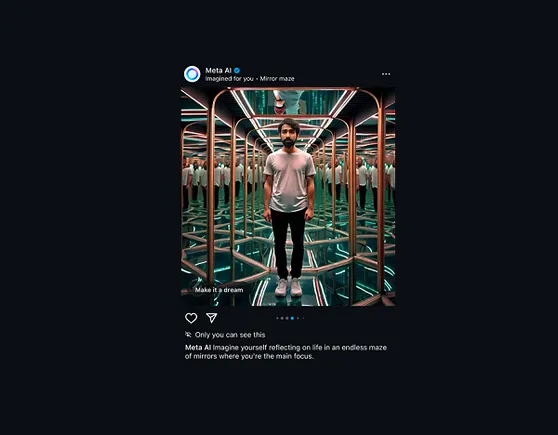Meta Creates User Images to Enhance Engagement with Its AI Tools

Meta’s New AI Experiment: Generating User Images
The Role of AI in Social Media
Social media continues to evolve, and a key component driving this change is artificial intelligence (AI). As we explore new horizons, it becomes increasingly essential for platforms to successfully integrate AI functionalities that resonate with users. Meta, which oversees platforms like Facebook and Instagram, is attempting to make significant strides in this regard.
Meta’s Latest AI Initiative
Recently, Meta has begun testing a new generative AI feature that creates images of actual users. By leveraging users’ selfie images uploaded to its systems, Meta crafts customized depictions in various imaginative scenarios. These images are then presented to users within their social media feeds, introducing an intriguing yet somewhat peculiar engagement method.
In one notable instance, a Reddit user shared their experience of seeing their own face featured in advertisements shortly after utilizing Meta’s AI editing functions. They expressed their surprise and curiosity through a post, highlighting the unexpected implications of using these AI tools.
User Reactions
Meta has confirmed that this feature is currently in testing, with some users reporting bizarre imagery of themselves appearing in their feeds. While many may find this novelty exciting, others see it as intrusive. The uncanny nature of these AI-generated images often falls into the "Uncanny Valley" effect—a phenomenon where a representation is almost human-like, but not quite, leading to discomfort.
Many people might not react positively to seeing a cartoon-like version of themselves, showing a level of concern that Meta did not fully anticipate. Research suggests that such near-realistic depictions can be off-putting, prompting questions about Meta’s marketing strategy.
Meta’s Vision for AI Integration
Interestingly, this initiative seems to reflect Meta’s broader vision for what users might seek from AI. The concept of users interacting with multiple variations of themselves, akin to being in a hall of mirrors, aligns with their strategy to roll out AI bot profiles across its platforms. The ambition is to create a space where users can engage with customized AI characters that respond to their preferences.
Perhaps, Meta believes that this personalization will enhance engagement, making the platform more appealing. By encouraging users to explore AI-generated images of themselves, they aim to increase the volume of content exchanged within their networks.
Increasing Popularity of AI Tools
Despite the mixed reactions, there’s undeniable traction for Meta’s AI tools. CEO Mark Zuckerberg recently reported that the Meta AI chatbot has garnered close to 600 million monthly active users. This figure indicates that a substantial portion of Meta’s user base, approximately one in five users, actively engages with its AI offerings. The integration of AI features directly into common functionalities, like the search bar, likely contributes significantly to this growth.
Investing in AI Development
To capitalize on this upward trend, Meta is investing heavily in enhancing its AI capabilities, including expanding its data centers. As the company seeks to establish itself as a leader in the AI arena, it must ensure that users find value in these tools.
Continued experimentation is crucial for Meta. The platform hopes that as more users create and interact with AI-generated content, interest in the technology will grow, leading to increased usage.
The Evolving Landscape of Social Media
However, there is a question of whether the integration of AI tools will detract from the authentic social experiences that platforms aim to foster. Social media traditionally focuses on sharing genuine moments and experiences, allowing users to connect based on real-life perspectives. Striking a balance between AI innovation and preserving authentic interaction will be essential as platforms evolve.
As curiosity about AI continues to thrive, Meta has positioned itself at the forefront of this technological shift. While the future remains uncertain, the ongoing engagement with AI suggests a changing landscape for how users experience social media.






